Diplomatic Bluebook 2024
Opening Special Feature
G7 Hiroshima Summit 2023 From Hiroshima to the World -Toward a World Characterized by Cooperation and Peace, Not Division and Confrontation-
2 G7 Foreign Ministers' Meeting
(1) G7 Foreign Ministers' Meeting in Karuizawa, Nagano (April)
At the G7 Foreign Ministers' Meeting, held in Karuizawa, Nagano from April 16 to 18, the G7 foreign ministers held frank and in-depth discussions, and the G7 Foreign Ministers' Communiqué was issued as the outcome of the meeting.
Throughout the sessions, the G7 foreign ministers confirmed to continue coordinating closely to the G7 Hiroshima Summit in May, and also discussed nuclear disarmament and non-proliferation, bearing in mind that the Summit would be held in Hiroshima. In addition, taking into account the fact that the meeting was held in Japan, the only G7 member in Asia, there were substantial discussions on the Indo-Pacific region, including China, North Korea, ASEAN, and Pacific Island countries.
As a result of the meeting, the G7 confirmed for the first time in writing its commitment to the free and open international order based on the rule of law, which Japan places importance on, and its strong opposition to any unilateral attempts to change the status quo by force or coercion anywhere in the world.
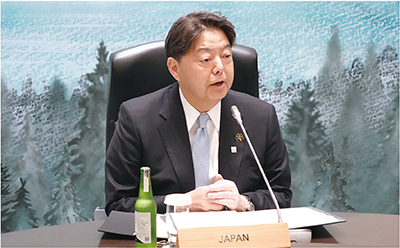 Foreign Minister Hayashi chairs the “Indo-Pacific” session (April 17, Karuizawa, Nagano Prefecture)
Foreign Minister Hayashi chairs the “Indo-Pacific” session (April 17, Karuizawa, Nagano Prefecture)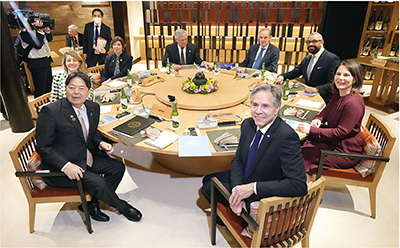 Working Dinner on the Indo-Pacific (April 16, Karuizawa, Nagano Prefecture)
Working Dinner on the Indo-Pacific (April 16, Karuizawa, Nagano Prefecture)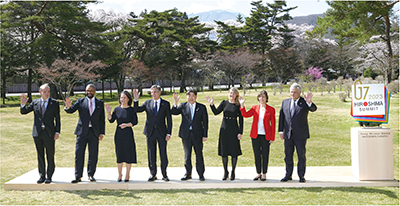 Commemorative photo of the G7 Foreign Ministers' Meeting (April 17, Karuizawa, Nagano Prefecture)
Commemorative photo of the G7 Foreign Ministers' Meeting (April 17, Karuizawa, Nagano Prefecture)(2) G7 Foreign Ministers' Meeting (November)
At the G7 Foreign Ministers' Meeting held in Tokyo on November 7 and 8, the G7 foreign ministers had frank and in-depth discussions, particularly on the situation in Israel and Palestine. As chair of the G7 Foreign Ministers' Meeting, Foreign Minister Kamikawa contributed to the coordination of the discussions and the issuance of a comprehensive message in the form of a Foreign Ministers' Statement.
Regarding the situation in Ukraine, the G7 confirmed that it would remain united in its attitude to impose severe sanctions against Russia and provide strong support for Ukraine, even in today's international situation, and also discussed the Indo-Pacific region, which is of utmost strategic importance. In addition, for the first time at a G7 foreign ministers' meeting, there was a dialogue with five Central Asian countries, which provided an opportunity to discuss areas of cooperation between the Central Asian countries and the G7.
Furthermore, wide-ranging discussions were held on cooperation with international partners, one of the priorities under the Japanese Presidency this year. The G7 Foreign Ministers commit to further building international solidarity beyond the G7 to address maintaining and strengthening the free and open international order based on the rule of law, and broader global challenges, such as climate change, nuclear disarmament, and gender equality including the Women, Peace and Security agenda (WPS).
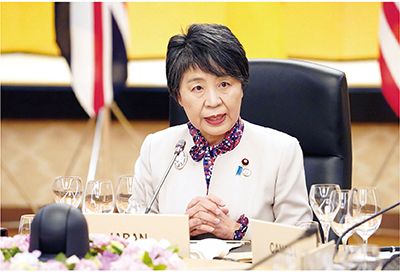 Foreign Minister Kamikawa chairs the Working Dinner on the Middle East (November 7, Iikura Guest House, Ministry of Foreign Affairs, Tokyo)
Foreign Minister Kamikawa chairs the Working Dinner on the Middle East (November 7, Iikura Guest House, Ministry of Foreign Affairs, Tokyo)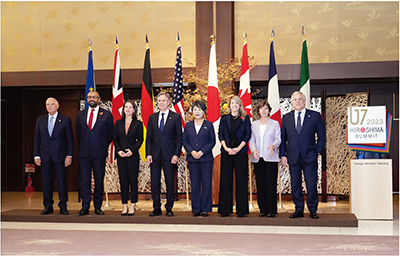 Group photo at the G7 Foreign Ministers' Meeting (November 8, Iikura Guest House, Ministry of Foreign Affairs, Tokyo)
Group photo at the G7 Foreign Ministers' Meeting (November 8, Iikura Guest House, Ministry of Foreign Affairs, Tokyo)